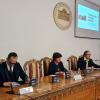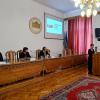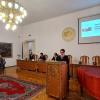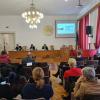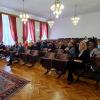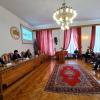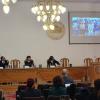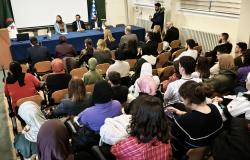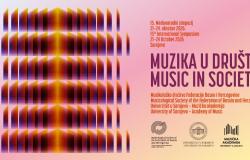Promotion of the scientific sound edition Series 4: Montenegrin folk music - field recordings
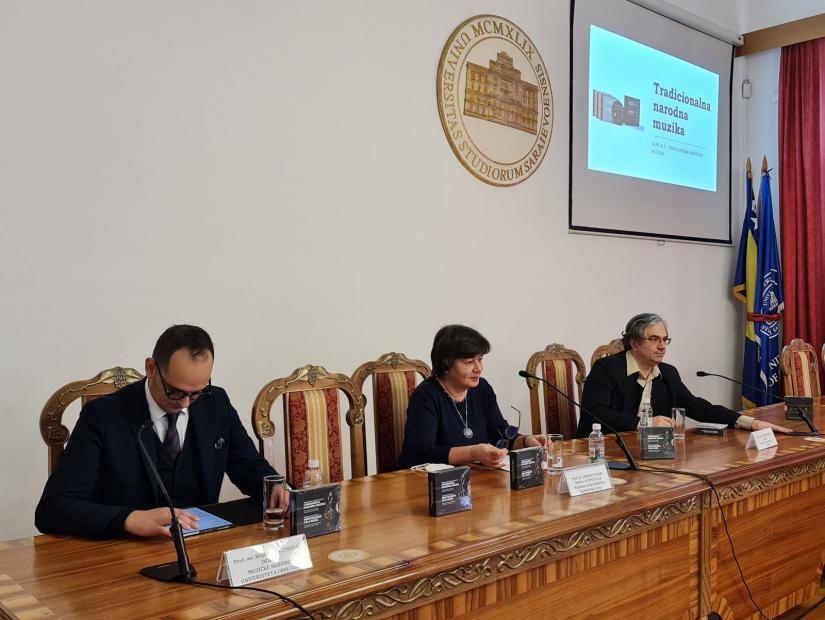
The publication was created within the project Musical Heritage of Montenegro - Musical Practices of Montenegro and their Potential - MusiH, in which researchers from the Institute of Musicology of the Music Academy of the University of Sarajevo and the Music Academy of the University of Montenegro collaborated.
At the promotion, Prof. Dr. Tamara Karača Beljak, Vice-Rector for Art, Art Research, Culture and Sports, University of Sarajevo, Prof. Mr. Ališer Sijarić, Dean of the Music Academy of the University of Sarajevo, Prof. Mr. Bojan Martinović, Dean of the Music Academy of the University of Montenegro and editor of the publication Prof. Dr. Jasmina Talam, Head of the Institute of Musicology of the Music Academy of the University of Sarajevo. The ceremony was attended by the Rector of the University of Sarajevo, Prof. Dr. Rifat Škrijelj, Chargé d'Affaires of the Embassy of Montenegro, Mrs. Satka Hajdarpašić, and professors of the Music Academy of the University of Sarajevo.
During her address, Vice Rector Karača Beljak emphasized the value of this scientific sound publication, which, as she stated, testifies to the heritage that may be forgotten today, testifies to the power of oral tradition, but also to the interests of ethnomusicological researchers related to the University of Sarajevo. the oldest university in Bosnia and Herzegovina.
Dean Sijarić pointed out that the goal is for the Music Academy to be a platform for the development of music as an art, but also the science of music, and that ethnomusicology is an important segment of that.
“The Music Academy is trying to cover all those fields that actually fall into its field of activity and to develop and modernize them, but also to get results that are socially relevant,” said Dean Sijarić, adding that the Music Academy of the University of Sarajevo and the Music Academy of the University of Montenegro have many years of cooperation in various fields, and that this is one of the projects that are very important because as a result it leaves an artifact - CD edition.
Mr. Bojan Martinović, Dean of the Music Academy of the University of Montenegro, reminded that the promotion of this CD release is the result of the project Musical Heritage of Montenegro - Musical Practices of Montenegro and their Potential Music funded by the Ministry of Science of Montenegro.
“There is no institution in Montenegro that deals with musical heritage, and Montenegro has a very diverse musical heritage. Any help in that sense, whether it is personnel, whether it is at the level of information or connecting with other institutions, is very important to us. Through the Music Academy of the University of Sarajevo, we have achieved numerous collaborations with the University of Ljubljana, institutions in Zagreb, Vienna, Sweden. Not only was the CD the fruit of this project, but also many other things that are equally important for our further progress,” stated Mr. Bojan Martinović, Dean of the Music Academy of the University of Montenegro.
Editor of the edition Prof. Dr. Jasmina Talam, head of the Institute of Musicology of the Music Academy of the University of Sarajevo, pointed out the importance of ethnomusicological research, as well as the importance of the archives of the Institute of Musicology
“The first recordings of Montenegrin music stored at the Institute of Musicology date back to June 1952. The recitation and singing of the prominent writer Ćamil Sijarić was recorded on them,” stated Professor Talam.
Considering that the past factor plays an important role in ethnomusicological research, Professor Talam concludes that the archival recordings of the Institute of Musicology are a very important source for studying the folk music tradition of Montenegro.
“The songs were performed by members of different ethnic groups and in different regions, which testifies to the richness and diversity of Montenegrin folklore and preserves the tradition in the social context as a culture of the past. Some of the recorded tunes can no longer be found in living folk practice. The transcription, ie the musical notation, enables the melody to be performed musically precisely, and the archive recording provides an insight into the elements of the melody's performance style,” says Professor Talam and concludes that these recordings provide an opportunity for reconstruction of certain musical forms. She emphasized that thanks to this release, the recordings will be available to the general public, which opens space for a more detailed study of the Montenegrin folk music tradition.
Ethnomusicologist Mr. Sc. Damir Galijašević performed a mix of folk songs from Montenegro with an accordion.
Scientific sound edition Series 4: Montenegrin folk music - field recordings of the Institute of Musicology of the Music Academy of the University of Sarajevo contains a booklet and three CDs on which 66 songs were recorded in the period from 1952-1984. The recordings recorded the singing of narrators from different Montenegrin regions - Ćamil Sijarić, Emina Dervović, Miljko Bulajić, Sulejman Đečević, Ćiril Peruđini and Hamdija Šahinpašić.




